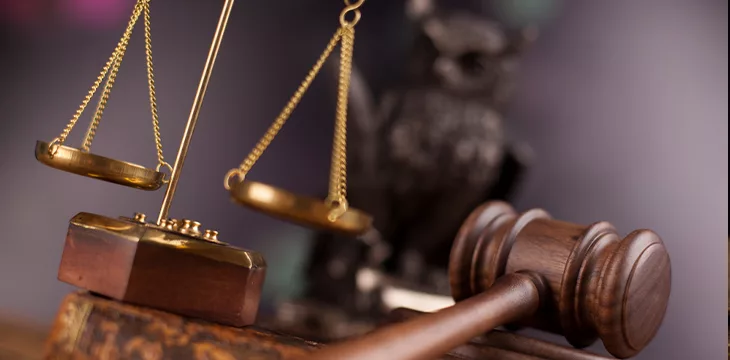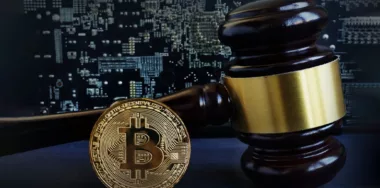On Monday, the Jack Dorsey-led Crypto Open Patent Alliance (COPA) will appear in court in London to try and convince a judge that Dr. Craig Wright is not Satoshi Nakamoto, the pseudonym behind the invention of Bitcoin.
Much is at stake. If Dr. Wright is Satoshi Nakamoto, then he has legal rights over the Bitcoin name and system which—if he chooses to enforce them—would massively disrupt the status quo across the digital asset industry. Given that Wright’s priority is to return Bitcoin to the foundational principles spelled out in the white paper—a peer-to-peer electronic cash system enabling small casual payments (micro-transactions) between parties without the use of an intermediary—any project currently promoting itself using the Bitcoin name is unlikely to survive a Wright victory at trial.
In other words, to anyone dependant on that status quo, Dr. Wright represents an existential threat.
Enter COPA, which was founded by Twitter founder Jack Dorsey and is built of a powerful collective of U.S.-based tech interests including Coinbase (NASDAQ: COIN), Kraken and Block. They are the status quo personified: the exchanges who are members of COPA have grown fat by skimming fees off the many Bitcoin knockoffs that have sprung up since Satoshi disappeared from the public eye; others are dependent on these knock-offs in other ways, such as Microstrategy (NASDAQ: MSTR) (which has accumulated so much BTC that any sustained reduction in its price would be cataclysmic). More broadly, any company dependent on a Bitcoin knockoff will be unlikely to survive Satoshi returning with the real thing.
This goes some way to explaining why COPA took the extraordinary step of reaching across the Atlantic ocean in order to file a multi-million dollar lawsuit against Dr. Wright, an individual British-Australian computer scientist, in the hopes they can get a court to discredit (and declare discredited) his life’s work.
COPA explains their lawsuit by saying it’s after Wright because, as its mission statement reads and as it has repeatedly told the court, COPA exists to “encourage the adoption and advancement of cryptocurrency technologies.” As Dr Wright is asserting his rights against Bitcoin developers in some cases and attempting to demonstrate how law applies to Bitcoin in others, COPA says he is disrupting the development of the digital asset industry and is therefore a threat to that mission.
Yet based on everything we know about Dr. Wright and everything we know about COPA, this explanation doesn’t hold water for a number of reasons.
The UK Law Commission recognizes the value of Dr. Wright’s litigation
Firstly, far from being a detriment to the industry, Dr. Wright’s various litigations have been applauded by the U.K. Law Commission in its long-awaited report on digital asset law in the U.K. for bringing a ‘high degree of certainty to the law’ around digital assets. In particular, it references Tulip Trading v Bitcoin Association and others, a suit brought against a group of blockchain developers by one of Dr. Wright’s companies which argues that developers of blockchains owe legal duties to the people who use them. While the duties question is still set to go to trial, the report cites early rulings from the Tulip case that demonstrate—as Dr. Wright has always said—that digital assets are legal property.
These words should carry a lot of weight (far more weight than you’re able to get from a COPA press release) because the U.K. Law Commission is the government body in charge of reviewing and recommending reforms to the legal system. They are not bound up in petty crypto disputes or ideological bickering: their priority is a well-functioning legal system.
Notably, the very Bitcoin developers COPA says it is protecting from unnecessary litigation recognize the value of the U.K. Law Commission’s words. In a poetic twist of irony, they had attempted to have the Tulip Trading case thrown out on the basis that it covered the same ground as the then-forthcoming Law Commission’s report, and therefore any ruling the court could give would risk stepping on the toes of the Commission. Both the High Court and the Court of Appeal rejected that argument. That’s a very a good thing, too—who knows what further clarity the Tulip case can still bring to the industry?
Compare the Law Commission’s glowing review to what can be said about COPA. In the three-plus years since it was formed, the Alliance has done precisely nothing—either within the digital asset industry or without—other than launch this suit against Dr. Wright. Its website is a wasteland containing only announcements of new additions to its roster and updates regarding its Satoshi litigation. If COPA is doing anything at all to advance the digital asset industry, you’ll find no evidence of it on their website or any of their channels.
This alone creates a big, awkward unanswered question for COPA: why do you really exist, and why are you trying to hide it? If it were really about the future growth of the industry, Dr. Wright should be considered an ally in those efforts, just as the U.K. Law Commission does. Yet it has poured more resources than most people could expect to spend in a lifetime into destroying his reputation.
COPA rejected a settlement that would have allowed it to fulfil its own mission
This contradiction became crystal clear to all last week, when COPA quickly rejected a settlement offer from Dr. Wright which was crafted to give COPA everything it claims to want: a path that would allow digital asset development can proceed unimpeded for the benefit of the industry.
In particular, it would allow the various derivatives of the original Bitcoin—BTC, BCH, ABC—to continue exploiting the Bitcoin name as part of its early history without charge or further litigation from Dr. Wright. Perhaps most significantly, it would have seen the various developers of Bitcoin agree on record to operate in full compliance will all applicable laws.
That last point has always been key for Dr. Wright, who has spoken and written at length about how he intended Bitcoin to work within the law rather than facilitate crime.
It should also be key for COPAs membership, some of whom are public companies (like Coinbase). No company can choose not to follow the law, but companies like Coinbase are under additional scrutiny by virtue of its relationship with public shareholders, who cannot be seen to be investing in a company that openly flouts the law.
So, on its face, the settlement allowed both sides of the equation to achieve their apparently shared mission of promoting the development of the digital asset industry.
To that end, Wright has been putting his money where his mouth is his entire career, from the initial design of Bitcoin (which distinguishes privacy and transparency from anonymity) through to this last-minute settlement offer to COPA.
COPA on the other hand has done nothing of the sort, and rejected the settlement within a day. Such a blatant contradiction will not go unnoticed by the Judge presiding over the upcoming trial.
Hard pass on that "settlement."
Just like Craig Wright forges documents and doesn't quite tell the truth, his description of the settlement offer isn't quite accurate either – it comes with loopholes that would allow him to sue people all over again.
— COPA (@opencryptoorg) January 24, 2024
Meta jumps ship on eve of trial
Nor has the contradiction gone unnoticed within COPA’s own membership, judging by a stunning development on the eve of trial. As the deadline for accepting Dr. Wright’s offer passed this week, COPA removed Meta from its membership list. Despite COPA publicly celebrating when Meta (NASDAQ: META) first joined the alliance in 2021, neither it nor Meta acknowledged the change.
Despite that silence, the timing speaks volumes. Internet archives show that Meta was still listed as a member on January 16, a week before Dr. Wright made his offer. This should not be considered a coincidence.
It can be speculated that the split was not amicable, because COPA’s website clearly states that members are unable to voluntarily withdraw from the Alliance within three years. As Meta joined in January 2022, it shouldn’t be possible for the company to withdraw for another year. Yet right as COPA definitively rejected Dr. Wright’s settlement by letting the deadline pass, Meta takes its chance to disassociate itself from COPA and its legal battle with Dr. Wright.
The optics are bad for COPA, who on Monday will have to convince a court that it is an honest actor whose only concern is a healthy digital asset ecosystem. However, for Meta, the optics of keeping itself hitched to the COPA wagon would have been much worse.
First of all, now that the settlement deadline passed without Dr. Wright’s offer being accepted, COPA cannot afford to lose at trial. If that happens, Dr. Wright is likely to enforce his rights in the Bitcoin name and system on much less favourable terms than what was just on offer. These harsher terms will ultimately still be a benefit to the industry given that Dr. Wright’s priorities are legal compliance and enterprise adoption, but the entities that have gotten fat off the status quo (many of which are included in COPAs membership) are unlikely to survive and will almost certainly be asked to account for the years of profiteering by passing off unrelated products as Bitcoin. Should that happen, COPA’s members will demand to know why their leadership did not take Wright’s olive branch.
As for Meta specifically, the company isn’t directly party to the Satoshi trial next week, but since the offer is made to COPA generally (as well as individual BTC developers), Meta would rightly expect to have a say in whether it should be accepted. This is especially so given that Meta (and COPA’s other members) have ostensibly joined the organization to protect and promote the development of digital asset technology, which the settlement itself seeks to do. Yet it’s almost certain that COPA didn’t give Meta (or anyone else) much say at all, because it rejected the settlement via Twitter within hours of it being offered. If Dr. Wright wins at trial, the last thing Meta wants to be associated with is the biggest legal blunder of all time.
Being generous to Meta, it’s also possible that Meta did not foresee that COPA would be used solely as a vehicle to wage a legal war on Dr. Wright. As months and years passed without any activity from COPA, Meta could have gotten to a point where it had to accept that it had been duped into cosigning the legal campaign against Dr. Wright. Coming to that realization would be enough to make any reputable company hit the ejector button, and Meta would likely be upset that its name was used to promote sustained, cynical legal attacks on an individual living abroad from them.
Another explanation is that Meta has seen itself come under scrutiny from U.S. lawmakers over its ties to the digital asset industry in recent weeks. Congresswoman Maxine Waters (D-CA), who is ranking member of the United States House Financial Services Committee, wrote to Meta’s leadership over recent trademark applications filed by the company which relate to the digital asset industry. Waters references a past letter sent to Meta, where she wrote “given the company’s troubled past, I am requesting that Facebook agree to a moratorium on any movement forward on developing a cryptocurrency until Congress and regulators have the opportunity to examine these issues and take action.”
In that light, Waters questioned the purpose of these filings given that Meta has gone on record before the Financial Services Committee that the company is no longer undertaking and digital asset-related work.
Given Waters’ enquiries, it makes sense that Meta would want to do everything possible to publicly divorce itself from all digital asset-related matters lest it be accused of lying to Congress. As much as taking down Dr. Wright would clear Meta’s path toward any re-entry into the industry, Meta knows it cannot claim to have stopped its digital asset operations while it is a member of an organization that is coming all the way to London to sue a lone computer scientist who has dedicated much of his life to creating the industry we see today.
Satoshi trial begins February 5
Beginning next week, the U.K. High Court will be looking at one narrow question: is Dr. Craig Wright Satoshi Nakamoto? Despite that narrow scope, the court and third-party observers should continually ask themselves: why did COPA bring this case? Why are they fighting so hard to discredit one individual?
COPA has so far been unable to give a satisfactory answer.
New to blockchain? Check out CoinGeek’s Blockchain for Beginners section, the ultimate resource guide to learn more about blockchain technology.








